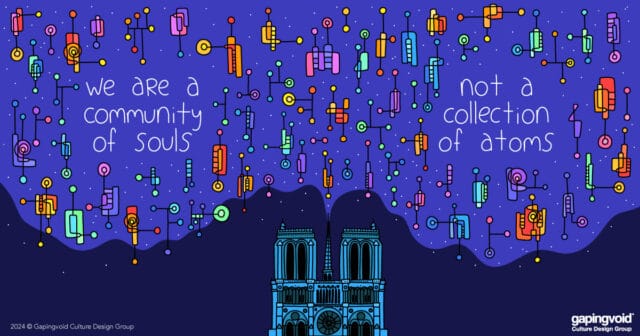
[“Possible Cloud Portrait”. Click here to enlarge/download/print etc.]
You hear a lot of talk about “The Cloud” nowadays.
The premise is simple. In the future, we won’t have or even need all our data or software programs on our own computers, they’ll be floating around somewhere on somebody else’s servers, accessible via the internet. A vast, interconnected “nebula” of other people’s data and servers, hence the word, “Cloud”.
Big players in this game so far include some familiar names like Sun, Microsoft, Amazon, Google, etc etc.
The way I’m seeing the future commonly talked about, is all this data and programs spread all over the networks of all these companies, relatively proportional to their current market caps. Some folk have their stuff with Sun, some with Amazon, etc.
But nobody seems to be talking about Power Laws. Nobody’s saying that one day a single company may possibly emerge to dominate The Cloud, the way Google came to dominate Search, the way Microsoft came to dominate Software.
Monopoly issues aside, could you imagine such a company? We wouldn’t be talking about a multi-billion dollar business like today’s Microsoft or Google. We’re talking about something that could feasibly dwarf them. We’re potentially talking about a multi-trillion dollar company. Possibly the largest company to have ever existed.
I imagine many of my friends who work for the aforementioned companies know all about this, and know how VAST the stakes are.
Windows vs Apple? Who cares? Kid’s stuff. There’s a much bigger game going on… And for some reason, its utter enormity seems to be a very well-kept secret, at least to non-combatants like myself.
[UPDATE:] My friend James Governor, who consults in this world, left the following comment below:
Totally agree Hugh. As I said on on my blog recently: “Customers always vote with their feet, and they tend vote for something somewhat proprietary – see Salesforce APEX and iPhone apps for example. Experience always comes before open. Even supposed open standards dorks these days are rushing headlong into the walled garden of gorgeousness we like to call Apple Computers.”
The players you mention will continue with The Great Game, but there is room for a new entrant (The Hun In The Sun).
[Bonus Link:] James also has a nice post on the subject, “Whose Cloud Is It, Anyway?”.
[UPDATE:] JP Rangaswami comments over on his blog, advocating Open Source as the antidote to Cloud Monopolies:
I have always had this sense that there is no longer any room for artificial monopolies, that the market will provide a self-correcting mechanism. But I have always been wrong on this. We can argue about why this is so, but not about the fact. Microsoft, Google and Apple are facts.
Open standards, open platforms and open source are ways to prevent this happening. Ways to guarantee that history won’t repeat itself. But this needs coherent communal action, something that is hard to achieve in emergent environments.
[PS: That “Power Laws” link is highly, highly, highly recommended reading. Just so you know.]



